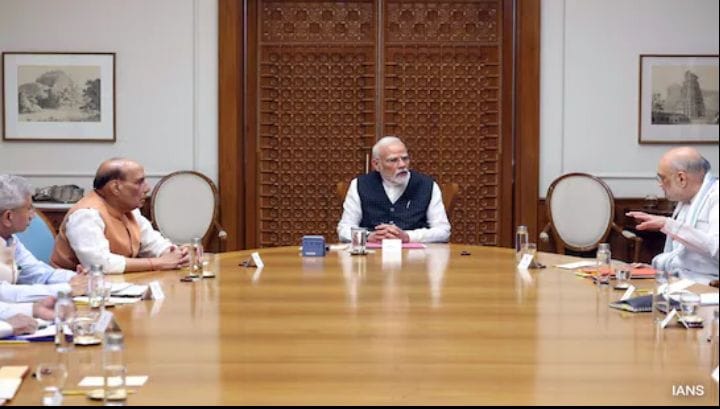Following the brutal terrorist attack in Pahalgam, where 26 innocent tourists were gunned down, PM Modi has held a high-level emergency meeting and granted the Indian Armed Forces full operational freedom to decide how and when to strike back.
This urgent meeting lasted nearly 1.5 hours at the PM’s residence in Delhi and included Defence Minister Rajnath Singh, National Security Advisor Ajit Doval, Chief of Defence Staff Gen. Anil Chauhan, and the chiefs of the Army, Navy, and Air Force.
“Decide your own target, your own time. You have full liberty,” PM Modi reportedly told the armed forces, as per top government sources.
He expressed complete confidence in the military’s capabilities and made it clear that the strategy, timing, and nature of the retaliation will be left entirely to the forces.

This is the second major security meeting in 48 hours, indicating the seriousness of India’s response. Army Chief Gen. Upendra Dwivedi, Navy Chief Admiral Dinesh K. Tripathi, and Air Chief Marshal Amar Preet Singh gave on-ground updates on the current situation in Jammu & Kashmir.
“The terrorists and their backers must be punished — severely, and beyond their imagination,” the Prime Minister reportedly said.
Quick Facts You May Not Know:
- Pahalgam is a top tourist hotspot in Kashmir, and this kind of massacre of civilians is extremely rare in that region.
- The government believes Pakistan’s hand is behind the attack, continuing a long legacy of cross-border terrorism.
- India’s current rules of engagement now allow preemptive, covert strikes — a strategic shift since the 2016 Uri attack.
- This “free hand” doctrine isn’t new but is being reactivated with full intensity, signaling a no-compromise national security stance.
India’s message to the world is clear: Terrorism will not be tolerated, and those who support it — directly or indirectly — will face consequences.